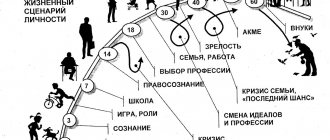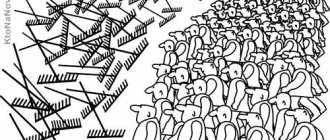Reflection (translated from late Latin means turning back) is one of the types of human mental activity aimed at understanding oneself and the existing universe.
It is an instrument of cognition that is actively used in philosophy. This is a way of knowing existing concepts and definitions that are open and accessible to man.
Reasoning is possible only in the case of known knowledge or problems that have arisen. In the absence of an initial theoretical basis, judgment is impossible. That is, the presence of some guiding component, elements for mental activity is always necessary.
Philosophical reflection faces the goal of a constant search for truth . It does not assert anything, but on the contrary, it casts doubt on existing ideas about certain objects of human perception. This phenomenon is thinking about thinking. At the same time, theories and all knowledge are processed.
Various points of view emerged during the formation of this concept. Ancient thinkers and philosophers differed in their opinions. There are a lot of options for interpreting the concept. Sometimes it feels more like some kind of race, like a desire to create your own unique version. And the more thinkers there were, the more complex they put forward their definitions.
Truth in philosophy is unpredictable and is comprehended step by step . Its concept can fluctuate quite greatly over the course of a person’s life. Here we can see the dependence of a change in perception and, consequently, obtaining a new understanding of the essence of what is happening. Thanks to perception, a person receives his real experience. But truth is not directly related to experience. Because the knowledge gained is always varied.
Thus, perception is of secondary importance in the problem of finding truth, since it does not provide adequate reliability. But at the same time, it is a tool for obtaining information. If perception only discovers something new, then apperception already confirms or shows a fact known to the subject, that is, it is expected and has no obvious unknown.
People turn to philosophical reflection to know themselves, to understand life.
Contents of reflection
The content of reflection is determined by objective-sensory activity: reflection is ultimately an awareness of practice, the objective world of culture (art, science, religion and philosophy itself). In this sense, reflection is a method of philosophy through which the specificity of the mental and spiritual world of man is revealed[2]. It is necessary to understand that it is reflection, along with the use of categorical language, that characterizes the philosophical form of thinking [3]. By and large, all philosophy is a reflection of the mind, representing reflections on such categories as acts and content of feelings, ideas and thoughts, reasoning, both objectified in language and relevant works of culture, and contained in consciousness itself[1].
How to get rid of reflection?
If the state of reflection is depressing and you want to get rid of it, here are some valuable tips from psychologists:
- It is important to make it a habit to greet people first.
- You need to be able to act confidently, or at least pretend to be a confident person. First you need to straighten your shoulders and lift your chin up.
- There is no need to be afraid to look people in the eyes. This way it will be clear to the person that there is interest in him and he will certainly reciprocate.
- It is important to learn how to conduct small talk. You can start with those people with whom it is really very easy and pleasant.
- Autotraining. From time to time you need to remind yourself of your own importance and uniqueness.
- You need to try to do what you are afraid of. If you manage to do something that you didn’t have the courage to do before, then there is no doubt that victory is ahead.
Reflection in self-knowledge
Consciousness is cognized with the help of itself, since today there are no tools for its direct research. Although one-time
directing consciousness to another object and to oneself does not seem feasible; retrospective attention to the work of one’s own consciousness is possible.
In addition, a single logical structure of consciousness unfolds in time as a connection between various mental acts, which makes it possible to distribute
the attention of consciousness to an external object and to oneself.
Thanks to all this, the so-called splitting
or
duplication
of consciousness is possible, when consciousness analyzes its own acts, through which it perceives, analyzes and explains this or that phenomenon [4].
Within the framework of many philosophical theories and concepts, reflection is considered as the most essential property of consciousness [5][6][7]. According to this view, only beings capable of being aware of the state of their psyche can be considered conscious. However, this approach is rejected by supporters of the intentional concept of consciousness, who assign the property of consciousness to reflect the role of a marker of the most developed forms of consciousness, and put the property of consciousness to make any object its content in the central place [4][8][9].
What influences a person's ability to reflect?
There is such a thing as personal reflection. If we talk about the ability to reflect, then they can develop, like all other abilities in the context of a specific activity. These capabilities can be presented within a specific structure. An example would be the structure of thinking and communication. A person who, when looking for a way out of a difficult situation, can successfully solve problems and rethink his own consciousness can be called capable of reflection.
Reflection and objectified knowledge
Reflection of the mind on the content of knowledge given in language, science and other forms of culture (objectified knowledge) forms new values, critically reflecting on the usual norms of human knowledge and behavior. In this way, the world of culture is mastered[1]. Reflection on the system of objectified knowledge consists, on the one hand, in its dismemberment, formulation of assumptions and idealization, and on the other hand, in clarifying this knowledge itself, rejecting the implicitly accepted premises. As a result of such reflection, a theoretical system is derived that differs relatively (relative to the previous objectified knowledge) by the true reflection of some real dependencies in a certain context, which, however, still presupposes a whole series of assumptions and a certain implicit “prerequisite” knowledge[10].
Notes
- ↑ 1 2 3 Ogurtsov A.P.
Reflection // New Philosophical Encyclopedia / Pred. scientific-ed. Council V. S. Stepin. - M.: Mysl, 2001. - T. 3. - ISBN 5-244-00961-3 - ↑
Reflection // Great Soviet Encyclopedia / Ch. editor A. M. Prokhorov. — 3rd edition. - M.: Publishing house "Soviet Encyclopedia", 1975. - T. 22. - ↑ Gromyko Yu. V.
Scheme and method in reflection. Philosophy and science. The concept of mental activity // Introduction to the theory of thinking and activity. - M.: Pushkin Institute, 2005. - ↑ 1 2 Vinnik D.V.
Reflexive and intentional states of consciousness: specificity and correlation //
Institute of Philosophy and Law SB RAS
Humanities in Siberia. - Novosibirsk, 2003. - No. 1. - P. 11-15. - ISSN0869-8651. - ↑ Jaegwon Kim.
Philosophy of Mind. - Colorado: Westview Press, 1998. - P. 165. - ↑ Armstrong D. M.
Materialistic theory of consciousness (chapter 17) //
Analytical philosophy: Selected texts
: Sat.. - M.: Moscow State University Publishing House, 1993. - P. 164. - ISBN 5-211-02147-9. - ↑ Ivanitsky A. M.
Consciousness: Criteria and possible mechanisms //
Brain and Mind
: Sat.. - M.: Nauka, 1994. - P. 165-166. — ISBN 5-02-008142-6. - ↑ Husserl Edmund.
Ideas towards pure phenomenology and phenomenological philosophy = Ideen zu einer reinen Phänomenologie und phänomenologischen Philosophie / Transl. with him. Mikhailova A. V. - M.: House of Intellectual Books, 1999. - T. 1. - P. 98-99, 170, 184, 188, 241. - ISBN 5-288-01804-9 - ↑ Motroshilova N.V.
Intentionality in “Logical Investigations” by E. Husserl //
Questions of Philosophy
. - 2000. - No. 4. - P. 138. - ISSN0042-8744. - ↑ Lektorsky V.A.
Self-awareness and reflection. Explicit and implicit knowledge // Subject, object, cognition / Rep. editor V. N. Sadovsky. - M.: Nauka, 1980. - P. 261.
Categories:
- Consciousness
- Thinking
- Philosophical terms
Wikimedia Foundation. 2010.
See what “Reflection (philosophy)” is in other dictionaries:
- Reflection - This term has other meanings, see Reflection (meanings). This article or section needs revision. Please improve the article according to... Wikipedia
- REFLECTION - (from Latin reflexio, turning back) the ability of human thinking for critical introspection. There are several types of R. Elementary R. consists of an individual's consideration and analysis of his own knowledge and actions. This type of R. is inherent ... ... Philosophical Encyclopedia
- PHILOSOPHY - (from the Greek phileo love, sophia wisdom, philosophia love of wisdom) a special form of social consciousness and knowledge of the world, developing a system of knowledge about the fundamental principles and foundations of human existence, about the most general essential... ... Philosophical Encyclopedia
- PHILOSOPHY OF CULTURE - (cultural philosophy) philosophy. discipline focused on philosophy. comprehension of culture as a universal and comprehensive phenomenon. The term “cultural philosophy” was used in the beginning. 19th century representative of the German romanticism by A. Muller.... ... Encyclopedia of Cultural Studies
- REFLECTION is a type of philosophical thinking aimed at understanding and justifying one’s own premises, requiring turning consciousness towards oneself. In philosophy, R. is the fundamental basis of both philosophizing proper and a prerequisite... ... History of Philosophy: Encyclopedia
- PHILOSOPHY OF CULTURE - philosophy. study of the principles and general patterns of culture. May exist as a specific theory or as an aspect of a broader concept. From F.k. cultural studies should be distinguished as a special humanitarian science that does not require... ... Philosophical Encyclopedia
- PHILOSOPHY OF LAW is the science of the most general theoretical and ideological views. problems of jurisprudence and state science. From legal sciences that study specific legal systems are distinguished by the fact that they pose and solve these problems in philosophy. level. F. p.... ...Philosophical Encyclopedia
- PHILOSOPHY IN THE USSR AND POST-SOVIET RUSSIA - PHILOSOPHY IN THE USSR AND POST-SOVIET RUSSIA 1. FORMATION OF SOVIET PHILOSOPHY. 1917 con. 20s The Bolshevik victory led to a sharp narrowing of the field of philosophical work. In post-October Russia, old and new philosophical societies closed, ... ... Philosophical Encyclopedia
- PHILOSOPHY OF NEW AND MODERN TIMES - PHILOSOPHY OF NEW AND MODERN TIMES period in the development of philosophical thought (17th-19th centuries), which gave a constellation of outstanding thinkers from various countries and peoples With all the uniqueness of the creative contribution of each of them, one can highlight the main ideas and... ... Philosophical Encyclopedia
- philosophy - PHILOSOPHY (from the Greek phyle love and sophia wisdom; love of wisdom) a special form of social consciousness and knowledge of the world, developing a system of knowledge about the fundamental principles and foundations of human existence, about the most general... ... Encyclopedia of Epistemology and Philosophy of Science
Books
- Philosophy and methodology of social sciences. Problems of social communication. Textbook for universities, Yaskevich Y.S.. At turning points in history, philosophical and methodological reflection in its various dimensions intensifies: from everyday life to science, from local to global, from national to global... Read more Buy for 1190 UAH (Ukraine only)
- Philosophy and methodology of social sciences. Problems of social communication. Textbook for universities, Yaskevich Ya.S.. At turning points in history, philosophical and methodological reflection in its various dimensions intensifies: from everyday life to science, from local to global, from national to... Read more Buy for 920 rubles
- Philosophy and methodology of social sciences. Problems of social communication 2nd ed., trans. and additional Textbook for universities, Yadviga Stanislavovna Yaskevich. At turning points in history, philosophical and methodological reflection intensifies in its various dimensions: from everyday life to science, from local to global, from national to... Read more Buy for 559 rubles e-book
Other books on request “Reflection (philosophy)” >>
Reflection
(from Latin reflectere “to reflect”) - in philosophy, a form of human mental activity aimed at understanding one’s actions, the entire human culture and its foundations[1].
What it is
In order to understand the concept of reflexivity, it is necessary to clarify the meaning of the word reflection, which implies the process of individuals turning attention inward and to their own consciousness, then reflexivity means the ability of subjects to comprehend their personality, to understand the origins of their own actions.
Thus, reflection is a qualitative characteristic indicating that consciousness is capable of directing attention inward. Reflexivity is a quantitative characteristic demonstrating the severity of such ability, criticality of analysis, and depth.
Reflection literally means going back. The concept of reflecting is used to denote the process of thinking about one’s own mental state, turning attention inward. In different sciences and philosophical views, the term in question has different meanings. Thus, Locke meant by reflection the source of specific knowledge when the action of consciousness is contemplated. Leibniz considered reflection to be the attention of individuals to what is happening within them. According to Jung, ideas are reflections on ideas received from the outside.
Summarizing all views, what is common in the interpretation of reflection is its focus on the inner world of individuals.
Reflexivity acts as a personal trait that characterizes self-directed cognition. The analyzed phenomenon is considered one of the most important characteristics of consciousness.
Psychologists emphasize the importance of separating the two similar phenomena above. Reflexivity in psychology is presented as a personal property, and reflection is a process of knowing one’s own personality.
In this case, the first refers to the quality of personality that determines reflection as a process. Reflexivity has a criterion of expression and is determined by the direction of the processes of cognition inside one’s own personality.
These two above phenomena are realized with the help of reflexive abilities.
Thus, reflexivity is the ability to analyze one’s own personality, discover the motives of one’s actions, including:
– past actions and events;
- emotional condition;
– successful or unsuccessful performance results;
– changing personality traits, character traits.
Each individual has a different level of reflection. It is determined by intellectual development, level of knowledge, and upbringing. Some subjects continuously analyze their own actions, reflect on the motivation of their actions, while others do not think about their own behavior at all. A huge role here is given to the individual’s desire to understand his own misconceptions, to realize mistakes, the level of self-criticism and the need to compare his own person with the environment.
The distinguishing feature of a mature personality is the ability to be responsible for committed actions and take responsibility for the existence that a person has. If an individual invariably blames the environment and circumstances for current events and current situations, then he is a weak person.
Reflexivity of consciousness is the ability to comprehend one’s own internal “Universe” and build a picture of personal states.
General consciousness performs the function of self-awareness (the ability to isolate one’s own person as a separate creation) with interaction and orientation to the external environment. It is inherent in all beings. While reflexive consciousness is responsible for self-knowledge (the ability to analyze the state of one’s own spiritual world), it is developed during development as a specific feature inherent exclusively in human consciousness.
The immediate possibility of reflection in individuals arises as a result of knowledge of the environment and, in particular, society. Mastery of historically developed operations of activity and methods of interaction with the environment gives rise to the need for reflection, and, consequently, leads to the emergence of a perfect form of reflection of reality. Only at the level of the perfect form of reflection does reflexivity of consciousness arise.
Contents of reflection
The content of reflection is determined by objective-sensory activity: reflection is ultimately an awareness of practice, the objective world of culture (art, science, religion and philosophy itself). In this sense, reflection is a method of philosophy through which the specificity of the mental and spiritual world of man is revealed[2]. It is necessary to understand that it is reflection, along with the use of categorical language, that characterizes the philosophical form of thinking [3]. By and large, all philosophy is a reflection of the mind, representing reflections on such categories as acts and content of feelings, ideas and thoughts, reasoning, both objectified in language and relevant works of culture, and contained in one’s own consciousness[1].
Reflection in self-knowledge
Consciousness is cognized with the help of itself, since today there are no tools for its direct research. Although one-time
directing consciousness to another object and to oneself does not seem feasible; retrospective attention to the work of one’s own consciousness is possible.
In addition, a single logical structure of consciousness unfolds in time as a connection between various mental acts, which makes it possible to distribute
the attention of consciousness to an external object and to oneself.
Thanks to all this, the so-called splitting
or
duplication
of consciousness is possible, when consciousness analyzes its own acts, through which it perceives, analyzes and explains this or that phenomenon [4].
Within the framework of many philosophical theories and concepts, reflection is considered as the most essential property of consciousness [5][6][7]. According to this view, only beings capable of being aware of the state of their psyche can be considered conscious. However, this approach is rejected by supporters of the intentional concept of consciousness, who assign the property of consciousness to reflect the role of a marker of the most developed forms of consciousness, and put the property of consciousness to make any object its content in the central place [4][8][9].
Hegel's philosophy
This thinker defined two types of reflection:
- Theoretical;
- Practical.
The first type helps a person to approach the solution of a question using reasoning. Analyzing and establishing connections between concepts allows us to obtain a picture that is close to the truth. According to Hegel, theoretical reflection brings a person closer to knowledge of his own essence. Practical reflection is a movement towards an ideal image of a person. And here motives are involved that encourage you to do something.
Hegel believes that thought finds itself only when it is able to generate itself. Thinking becomes adequate with awareness of the thinking process itself; when considering thinking as an object. Reflection subjects consciousness to analysis; it processes ready-made material.
Reflection and objectified knowledge
Reflection of the mind on the content of knowledge given in language, science and other forms of culture (objectified knowledge) forms new values, critically reflecting on the usual norms of human knowledge and behavior. In this way, the world of culture is mastered[1]. Reflection on the system of objectified knowledge consists, on the one hand, in its dismemberment, formulation of assumptions and idealization, and on the other hand, in clarifying this knowledge itself, rejecting the implicitly accepted premises. As a result of such reflection, a theoretical system is derived that differs relatively (relative to the previous objectified knowledge) by the true reflection of some real dependencies in a certain context, which, however, still presupposes a whole series of assumptions and a certain implicit “prerequisite” knowledge[10].
Notes
- ↑ 123
Reflection // New Philosophical Encyclopedia / Pred. scientific-ed. Council V. S. Stepin. - M.: Mysl, 2001. - T. 3. - ISBN 5-244-00961-3. - ↑Reflection // Belt - Safi. - M.: Soviet Encyclopedia, 1975. - (Great Soviet Encyclopedia: [in 30 volumes] / chief editor A. M. Prokhorov; 1969-1978, vol. 22).
- ↑ Gromyko Yu. V.
Scheme and method in reflection. Philosophy and science. The concept of mental activity // Introduction to the theory of thinking and activity. - M.: Pushkin Institute, 2005. - ↑ 1 2 Vinnik D.V.
Reflexive and intentional states of consciousness: specificity and correlation //
Institute of Philosophy and Law SB RAS
Humanities in Siberia. - Novosibirsk, 2003. - No. 1. - P. 11-15. - ISSN0869-8651. Archived from the original on August 8, 2011. - ↑ Jaegwon Kim.
Philosophy of Mind. - Colorado: Westview Press, 1998. - P. 165. - ↑ Armstrong D. M.
Materialistic theory of consciousness (chapter 17) // Analytical philosophy: Selected texts: Sat.. - M.: Moscow State University Publishing House, 1993. - P. 164. - ISBN 5-211-02147-9. - ↑ Ivanitsky A. M.
Consciousness: Criteria and possible mechanisms // Brain and Mind: Sat.. - M.: Nauka, 1994. - P. 165-166. — ISBN 5-02-008142-6. - ↑ Husserl Edmund.
Ideas towards pure phenomenology and phenomenological philosophy = Ideen zu einer reinen Phänomenologie und phänomenologischen Philosophie / Transl. with him. Mikhailova A.V. - M.: House of Intellectual Books, 1999. - T. 1. - P. 98-99, 170, 184, 188, 241. - ISBN 5-288-01804-9. - ↑ Motroshilova N.V.
Intentionality in “Logical Investigations” by E. Husserl // Questions of Philosophy. - 2000. - No. 4. - P. 138. - ISSN0042-8744. - ↑ Lektorsky V.A.
Self-awareness and reflection. Explicit and implicit knowledge // Subject, object, cognition / Rep. editor V. N. Sadovsky. - M.: Nauka, 1980. - P. 261.
This page was last edited on November 9, 2022 at 07:51. Sources used:
- https://dic.academic.ru/dic.nsf/ruwiki/1612648
- https://wiki2.org/ru/reflection_(philosophy)









